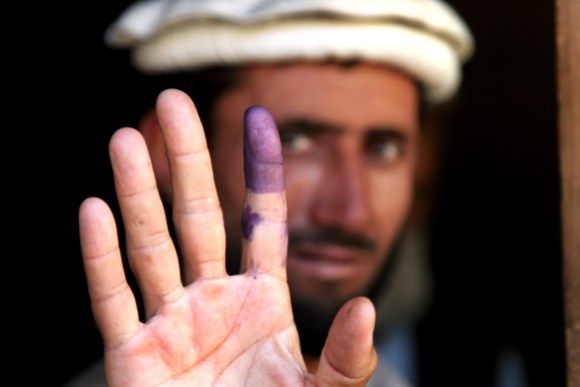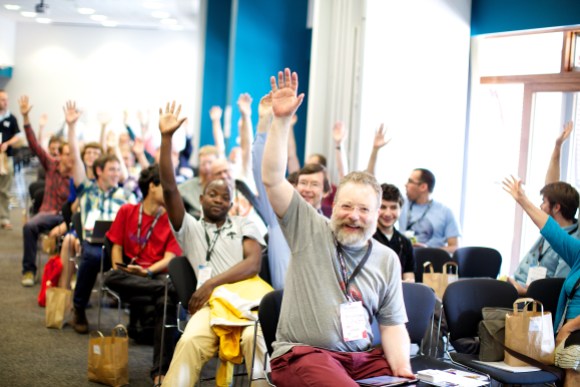
How is the Wikimedia community’s health? Where do volunteer developers prefer to collaborate? What do Wikimedians think about partnerships? What is the most important workflow for editors?
These are only a few of the questions that the Wikimedia Foundation is asking in a new global community survey for Wikimedians. The opinions gathered from this survey will directly affect how the Foundation supports Wikimedia communities. The new survey, called Community Engagement Insights, is part of the Foundation’s annual plan. It was developed with input from 13 different teams at the Wikimedia Foundation and tested with Wikimedia volunteers.
Take the survey to influence decisions at the Foundation!
Surveys are important because they help us to design solutions, keeping community members in the heart of every project. In 2014, for example, we had many questions about harassment: How do our users experience harassment? What kinds of harassment are most common on which projects? How well Foundation staff were able to address harassment issues? The harassment survey was not a solution; it was the beginning of a conversation that has led to many actions.
Since the survey was completed, the movement has continued to take direct actions towards addressing the issue, from working on better detection (called Detox), to facilitating workshops and creating training modules. With the information from the survey, we were able to better understand the issues our communities and to begin taking action. The harassment survey will continue to inform future approaches to the problem.
Other surveys we have done recently include Reimagining Grants in mid 2015, which we used to help improve the support the Foundation offers through grants; an executive director survey in early 2016, which the Foundation used to help inform our search for the Foundation’s new executive director; the Tool Labs survey, which we used to identify needs in in the labs space and will help in planning for 2017-2018 year. These are only some examples of how asking the right thing at the right time can have an impact in our movement.
Wikimedia is a global movement of people, that goes beyond the online projects. Communities of volunteers are formed by citizens of the world that help create free access to knowledge. As a movement, we discuss and work on advocacy, mentorship, leadership, technology, collaboration and internationalization, among many other themes. The Foundation needs to make decisions and fund programs that will support Wikimedia communities in those specific areas. The Foundation also needs to learn and improve these programs. Are they being effective? Are they having the intended impact? Are these the right programs right now? The best way to answer these questions is to use tools that help us listen to communities. These not only include wiki pages, mailing lists, and conferences, but also consultations, interviews and surveys.
Community Engagement Insights is a new tool to help the Foundation listen to Wikimedia communities. This project seeks to improve surveys so the Foundation can try to hear from many voices equally and to make sure we are supporting and growing with the communities we directly assist. In other words, everyone who takes this survey can have a voice in deciding how the Foundation will improve their support. The data we collect will inform and guide the work of several teams at the Foundation.
Community Engagement Insights is not just a new survey; it is a new process that will support systematic surveys for the Wikimedia Foundation. The process would be highly collaborative and includes designing questions and capturing data from various audiences that can help support decisionmaking for the Foundation. For this year, the survey will reach out to very active editors, active editors, affiliates, program leaders, and volunteer developers. In future years, the audiences might expand. We hope the data will also be useful for the broader movement. We are working to make the datasets accessible to anyone while protecting the privacy of users.
The collaborative aspect of this survey was specifically designed to reduce the number of times the Foundation polls communities on any given topic.

Working towards actionable data
When we asked teams to come up with questions, we made sure that we understood their goals for each question and we asked how they intend to use the information they get for each prompt. If this information was unclear, we worked with the team to make sure there is a clear line of sight between the question and further actions.
Thirteen teams at the Foundation want to hear from Wikimedia communities. Here are some examples of the data they need: The Community Engagement Department wants to know about community health, because we need to learn more about how well we are collaborating, how well we support each other, and how engaged our volunteer community feels. The Technical Collaboration team wants to know about volunteer developer preferences in programming languages and collaboration spaces because we have a community of developers for whom we need to improve our support. The Global Reach team is working on expanding and changing their scope and they need to know what concerns communities have about different types of partnerships, including Wikipedia Zero, before making decisions about the types of partnerships they will pursue. The Editing Department needs to know more about which aspects of editing are more important for volunteers, so that the Foundation’s software developers can better prioritize their work improving the editing experience.
We are trying to get better at listening to communities, and surveys are one of the best ways we can do it for such a huge and diverse community. We also hope that having this process can help to reduce survey fatigue in the movement. As the project evolves, we hope it will begin to incorporate other surveys towards this end, and also to improve the quality of the data collected.
When you see the survey in your talk page, email, mailing list, or social media, remember that your opinions will directly affect the Foundation’s work.
Find out more information about Community Engagement Insights in our Frequently Asked Questions. You can learn how we are doing the sampling process, what kinds of questions we are asking, and which teams are participating.
Edward Galvez, Survey specialist, Learning and Evaluation team
María Cruz, Communications and outreach coordinator, Learning and Evaluation team

Can you help us translate this article?
In order for this article to reach as many people as possible we would like your help. Can you translate this article to get the message out?
Start translation